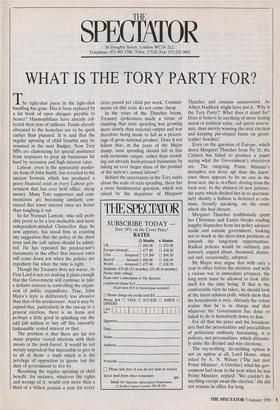56 Doughty Street, London WC1N 2LL Telephone: 071-405 1706; Telex:
27124; Fax: 071-242 0603
WHAT IS THE TORY PARTY FOR?
The tight-shut purse in the tight-shut handbag has gone. Has it been replaced by a fat book of open cheques payable to bearer? Haemophiliacs have already col- lected their tens of millions. Funds already allocated to the homeless are to be spent earlier than planned. It is said that the regular uprating of child benefits may be resumed in the next Budget. Now Tory MPs are clamouring for special assistance from taxpayers to prop up businesses hit hard by recession and high interest rates.
Labour, even in the apparently moder- ate form of John Smith, has reverted to the ancient formula which has produced a grave financial crisis in every Labour gov- ernment that has ever held office: cheap money. Many Tory supporters and com- mentators are becoming similarly con- vinced that lower interest rates are better than toughing it out.
So far Norman Lamont, who will prob- ably prove to be a less malleable and more independent-minded Chancellor than he now appears, has stood firm in resisting any suggestion that the policy of the short term and the soft option should be admit- ted. He has repeated his predecessor's statements to the effect that interest rates will come down not when the politics are expedient but when the time is right.
Though the Treasury does not waver, its First Lord is not yet making it plain enough that the Government will continue to take a definite interest in controlling the expan- sion of public expenditure. True, John Major's style is deliberately less abrasive than that of his predecessor. And it may be argued.that, particularly in the run-up to a general election, there is no harm and perhaps a little good in splashing out the odd £40 million to buy off this currently fashionable vested interest or that.
The problem is that there are far too many popular vested interests with their snouts in the pork-barrel. It would be not merely imprudent but impossible to give in to all of them: a truth which it is the privilege of opposition to ignore but the duty of government to live by.
Resuming the regular uprating of child benefit, for instance, whatever the rights and wrongs of it, would cost more than a third of a billion pounds a year for every extra pound per child per week. Commit- ments on this scale do not come cheap.
In the years of the Thatcher boom, Treasury spokesmen made a virtue of claiming that state spending was growing more slowly than national output and was therefore being made to fall as a percen- tage of gross national product. Does it not follow that, in the years of the Major slump, state spending should fall in line with economic output, rather than crowd- ing out already hard-pressed businesses by taking an ever larger share of the product of the nation's annual labour?
Behind the uncertainty in the Tory ranks about the scale of state spending, there lies a more fundamental question, which was raised by the departure of Margaret
Thatcher and remains unanswered. As Albert Haddock might have put it, 'Why is the Tory Party?' What does it stand for? Does it believe in anything of more lasting moral or political value, sub specie aeterni- tatis, than merely winning the next election and keeping pin-striped bums on green- leather benches?
Even on the question of Europe, which drove Margaret Thatcher from No 10, the Cabinet has failed to produce a paper saying what the Government's objectives are. The outgoing Prime Minister's metaphor was more apt than she knew: since there appears to be no one in the front seat, she is, in effect, driving from the back seat. In the absence of new policies, the party which ditched her in so spectacu- larly shoddy a fashion is destined to con- tinue, broadly speaking, on the route which she had chosen.
Margaret Thatcher traditionally spent her Christmas and Easter breaks reading lengthy dispatches from her policy advisers inside and outside government, looking not so much at the short-term problems as towards the long-term opportunities. Radical policies would be outlined, put forward, argued about, discussed, dismis- sed and, occasionally, adopted.
Mr Major may argue that with only a year in office before the election, and with a vicious war in immediate prospect, the long term must be allowed to look after itself for the time being. If that is the comfortable view he takes, he should look at the latest opinion polls, which show that his honeymoon is over. Already the voters realise that he is in charge and that whatever the Government has done or failed to do is henceforth down to him.
For all that the press and the broadcas- ters find the personalities and peccadilloes of politicians endlessly fascinating, it is policies, not personalities, which ultimate- ly unite the divided and win elections.
The say-nothing, do-nothing option is not an option at all. Lord Home, when asked by A. N. Wilson (`The last nice Prime Minister', 6 October) what his gov- ernment had done in the year when he was Prime Minister, replied: 'We couldn't do anything except await the election.' He did not remain in office for long.










































 Previous page
Previous page